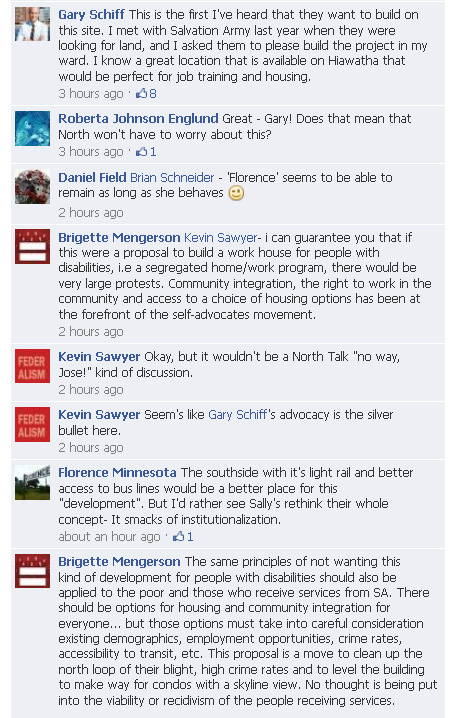Does the North Side of Minneapolis have much of a choice when it comes to development? The area, already a concentration of poverty, is the site of a proposed Salvation Army development that builds a warehouse and housing on what is now a vacant industrial piece of land. The operation is intended to help people in treatment.
And, Sam Black at Minneapolis / St. Paul Business Journal reports, the neighborhood doesn’t want it, citing Facebook-organized opposition. Some residents say it would only further concentrate poverty and isn’t the kind of development they want.
It wasn’t the kind West St. Paul wanted either when the Salvation Army intended to build its development there, only to be turned away by the city.
“The Salvation Army’s plan for redevelopment would substantially improve and re-engage the industrial and day-to-day job activities consistent with the past uses of the property,” the Salvation Army says
But on the North Talk Facebook page, the reviews are decidedly negative.
Yesterday, mayoral candidate Gary Schiff offered to host in his ward…

Meanwhile, in Edina, residents are upset that people with money are buying old homes, tearing them down, and building bigger ones, thus increasing property values, the Star Tribune noted today in an editorial.
2) WHAT IF JAMES EARL JONES WAS WRONG?
What if we won’t always have baseball? What if they won’t come?
Baseball is about to embark a new season and there’s absolutely no hope in Minnesota, and Minnesota isn’t alone. Without hope, people with something else to do tend not to go to ballgames, leaving the die-hards behinds, and there aren’t enough die-hards anymore to sustain franchises with only die-hards.
In this week’s City Pages, Pete Kotz captures the extent of the mess…
Baseball has been declining in interest for some time in terms of the young male audience,” says Patrick Rishe, an economist who studies sports at Webster University in St. Louis. “I think baseball is seen as archaic. The sport moves at a slower pace. Their athleticism doesn’t jump off the screen. I think they have to find a way to speed it up.”
But much like the Republican Party, the game is hamstrung by its sizable purist wing, those who believe the slightest change invites heresy. Meanwhile, the economic disparities continue to mount.
The game survives on TV revenue and Kotz opines that it’ll dry up someday soon because the non-fans are subsidizing the sports channels on your cable system by not being allowed to pay for only the stations you watch.
The cable pay structure will change and when it does, baseball fans — the ones remaining — will be shelling out a lot more to watch the games.
With relatively little fanfare, Somali radio listeners in central Minnesota got something they haven’t had to now — full-time radio programming. KVSC, the station at St. Cloud State, this week started a 24-hour webstream — St. Cloud Somali Radio .
“We will work to bring people together,” Abubaker Kulletin, the project developer, said in a release. “Somalis can introduce themselves to the local population, and easily integrate; becoming a larger part of the communities in Central Minnesota.”
Ahmed Abdi, a volunteer host, tells the St. Cloud Times that Somalis who aren’t fluent in English may know more about news in Somalia than what’s happening in Minnesota.
“Once you understand what’s happening, then you can connect. If you don’t understand what’s happening, you are not connected,” he said.
The project is funded by the Minnesota Arts and Cultural Heritage Legacy fund.
More media: The NPR program, The Moth, is holding story slams in the Twin Cities. Count the number of MPR News people in the audience or participating.
The apparent lack of diversity is rather striking.
Teresa Boardman, who writes the Saint Paul Real Estate blog
writes today that downtown Saint Paul is the city’s “most walkable neighborhood.”
“What seems noisy to suburbanites seems vibrant to city residents,” she says. Summit Hill is number two.
Yesterday, Saint Paul Mayor Chris Coleman held listening sessions with out-of-town college kids to find out what would make them stay in Saint Paul after graduation.
“If I’m going to stay in St. Paul, I really want to be convinced that these are cities that are going to continue to be really fun and really interesting, and cities that I can brag about to people back in New York,” Alex Schieferdecker of New York, a Macalester senior, said, according to the Star Tribune.
Coleman said he was struck that young people want neighborhoods identified with young people.
The Pioneer Press, however, reported at his stop at a less affluent locale — Metro State — where the comment seemed markedly different — focusing on crime and Saint Paul’s diversity, compared to Minneapolis.
Related: Could electric bikes persuade more non-cyclists to go biking? Is it cheating? (BBC)
5) THE UGLY SIDE OF GOOD INTENTIONS
People responded with kindness in the aftermath of the shooting of Officer Tom Decker in Cold Spring last year, holding fundraisers and donating money to… someone. WCCO reports there’s a nasty fight underway over where that money goes.
Bonus I: Tiger’s back… and this time he’s bringing help. Yes, it’s an ad for a video game. Just go with it.
Bonus II: More companies are supporting same-sex marriage as part of a marketing strategy.
AdFreak says vodka makers led the way yesterday on social media.
Bonus III: Fracking may have caused an earthquake in Oklahoma. “The new study adds to an increasing body of evidence that the injection of wastewater from fracking – rather than the wellhead injection that extracts gas or oil – is correlated to an increase in seismic events,” the BBC says.
Bonus IV: What music would you want to hear on the radio for your very last commute? (MPR)
TODAY’S QUESTION
Dennis Blankensop, a councilmember from the northeast Minnesota town of Cohasset has for the past couple months been “virtually” attending council meetings via Skype software from his condo in Palm Springs, Calif. Today’s Question: Should public officials be allowed to cast votes remotely?
WHAT WE’RE DOING
Daily Circuit (9-12 p.m.) – First hour: DOMA and Proposition 8 before the Supreme Court.
Second hour: Author, essayist and film critic Phillip Lopate.
Third hour: Researchers at the Mayo Clinic, in collaboration with a group of international scientists, today will release the results of genetic studies on breast and ovarian cancer that could lead to better screening tests for women. We’ll speak with one of the researchers about the results.
MPR News Presents (12-1 pm): Pulitzer Prize-winning journalist Isabel Wilkerson, speaking with MPR’s Stephen Smith about her book, “The Warmth of Other Suns: The Epic Story of America’s Great Migration.”
Talk of the Nation (1-2 p.m.) – The Political Junkie. Another Democrat plans to leave the Senate. New York Mayor Michael Bloomberg throws 12 of his millions into an ad war with the NRA. Congresswoman Michele Bachmann faces an ethics probe. And updates on special elections in South Carolina and Massachusetts.
All Things Considered (3-6:30 p.m.) – TBA

